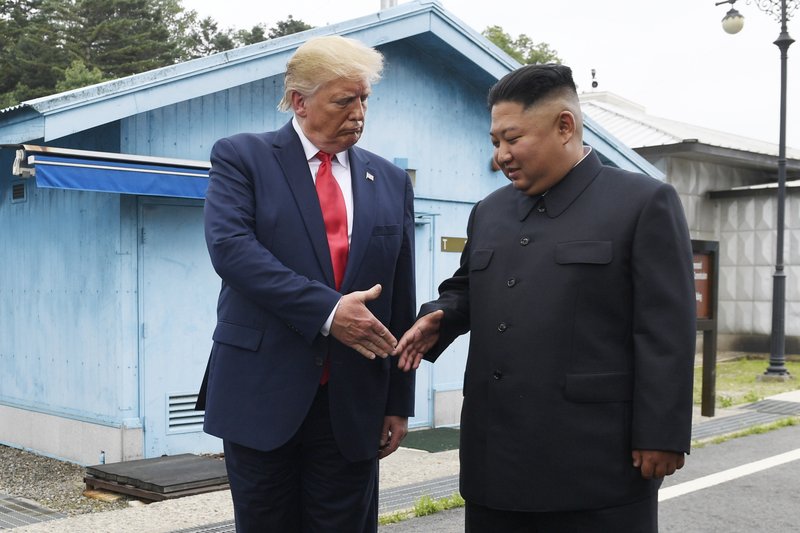SEOUL, South Korea -- North Korea insulted U.S. President Donald Trump again on Monday, calling him a "heedless and erratic old man" after he tweeted that North Korean leader Kim Jong Un wouldn't want to abandon a special relationship between the two leaders and affect the American presidential election by resuming hostile acts.
A senior North Korean official, former nuclear negotiator Kim Yong Chol, said in a statement that his country wouldn't cave in to U.S. pressure because it has nothing to lose and accused the Trump administration of attempting to buy time ahead of an end-of-year deadline set by Kim Jong Un for Washington to salvage nuclear talks.
In a separate statement, former Foreign Minister Ri Su Yong said Trump's comments were a "corroboration that he feels fear" about what North Korea might do when Kim's deadline expires and warned Trump to think twice if he wants to avoid "bigger catastrophic consequences."
On Sunday, Trump tweeted: "Kim Jong Un is too smart and has far too much to lose, everything actually, if he acts in a hostile way ... North Korea, under the leadership of Kim Jong Un, has tremendous economic potential, but it must denuclearize as promised."
He was referring to a vague statement issued by the two leaders during their first summit in Singapore in June last year that called for a nuclear-free Korean Peninsula without describing when or how it would occur.
Trump added that Kim "does not want to void his special relationship with the President of the United States or interfere with the U.S. Presidential Election in November."
Kim Yong Chol said Trump's tweets clearly show that he is an irritated old man "bereft of patience."
"As [Trump] is such a heedless and erratic old man, the time when we cannot but call him a 'dotard' again may come," Kim Yong Chol said.
"Trump has too many things that he does not know about [North Korea]. We have nothing more to lose. Though the U.S. may take away anything more from us, it can never remove the strong sense of self-respect, might and resentment against the U.S. from us."
Kim Yong Chol traveled to Washington and met with the U.S. president twice last year while setting up the summits with Kim Jong Un.
In his statement, Ri, currently a vice chairman of the ruling Workers' Party's Central Committee, said Trump would be well advised to stop using "abusive language" that may offend Kim.
"Trump might be in great jitters but he had better accept the status quo that as he sowed, so he should reap, and think twice if he does not want to see bigger catastrophic consequences," Ri said.
"Our final judgment and decision which will soon be made at the end of this year are to be done by the chairman of the State Affairs Commission, and he has neither clarified any stand yet nor made any ironic and irritating expressions toward the other party as done by someone," Ri added, referring to Kim by one of his government titles.
On Sunday, North Korea's Academy of National Defense said a "very important test" was conducted at a long-range rocket facility on the country's western coast, touching off speculation that the North could have tested a new rocket engine for either a satellite-launch vehicle or a solid-fuel intercontinental-range missile.
According to the North's Academy of National Defense Science, the test was conducted on Saturday at its Sohae Satellite Launching Ground in the northwest, where North Korea has conducted banned satellite launches and missile engine tests in recent years.
When Kim Jong Un met Trump and South Korean President Moon Jae-in last year, he promised to dismantle the facility, better known as the Tongchang-ri site outside North Korea, as part of steps toward disarmament. The latest test lends credence to widespread skepticism about Kim's seriousness in his commitment to denuclearization that he repeated during meetings with Trump and Moon.
Jeffrey Lewis, director of the East Asia Nonproliferation Program at the Middlebury Institute, tweeted that satellite images "suggest North Korea conducted a rocket engine test at Sohae."
Analyst Kim Dae-young at the Korea Research Institute for National Strategy in South Korea said the test is likely related to a space launch vehicle, not an intercontinental ballistic missile. He said North Korea would not conduct a long-range missile launch or nuclear test unless it completely abandons talks with the U.S.
Shin Beomchul, an analyst from Seoul's Asan Institute for Policy Studies, said the test is likely to be for a new solid fuel engine for an ICBM or a space launch vehicle. Either would allow North Korea to pressure the Trump administration for concessions without testing an ICBM or a nuclear device, which is where Washington apparently draws a red line, Shin said.
The use of solid fuel offers greater mobility for missiles and rockets and reduces the amount of launch preparation time. All space launch vehicles and ICBMs that North Korea has publicly tested used liquid propellants. They include the rockets used in two successful satellite launches in 2012 and 2016 and ICBMs used in three flight tests in 2017.
Information for this article was contributed by Hyung-Jin Kim of The Associated Press.
A Section on 12/10/2019

